Helen Hunt, 60, Stuns During Her Latest Appearance, and Her Lips Become the Center of Attention

So you’re at home, enjoying your evening tea under a warm blanket, when all of a sudden you see a huge — no, enormous! — mosquito. Its long and gangling legs have a span of your palm, and it clumsily bumps into all the obstacles it meets. Despite its awkward appearance, it’s still terrifying!
What if it carries malaria? What if it eats you alive in your sleep?! Slowly, not to draw the monster’s attention to yourself, you get out from your soft chair and run for it into the bathroom, lock yourself in there and open the browser on your phone. After a few seconds, you draw a ragged breath of relief.
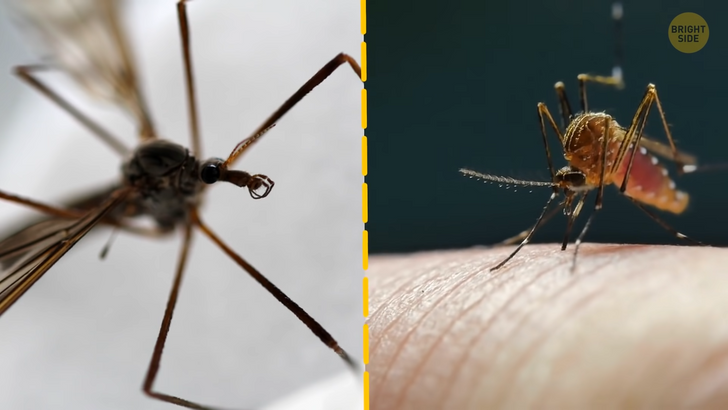
Turns out it’s just a crane fly — not a mosquito at all. It might look like a ferocious beast, but it’s actually peaceful and even defenseless. Many crane flies don’t even have mouths, so they don’t eat at all, and those that have a mouthpiece will only munch on sweet flower nectar.
Crane flies are really clumsy in the air — their rather short wings are no match for their huge bodies and long legs, so they’re slow, and it’s easy to catch them. Birds and frogs, as well as bats and cats love them as a treat. The only way they can avoid being eaten is by losing a limb — their legs easily break off even when nothing touches them.
And if you’re still unconvinced not to scram and set your house on fire when you see one, consider this: crane flies can tell you if the water pool you’re about to swim in is of good quality. If you see these bugs on or above the water, you’re good to go. Even more, fishers often make their bait look like crane fly larvae: this makes it more appetizing for the fish.
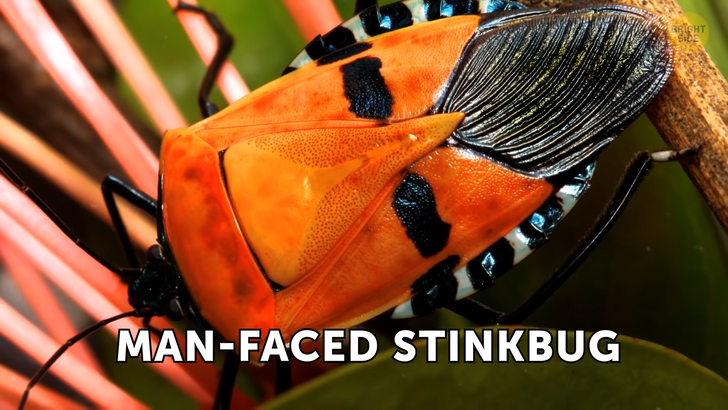
But while googling, you get engrossed with reading up on some other weird and crazy bugs. For example, here’s the human-faced stinkbug. No, they don’t really stink, at least for humans: they give off pheromones that attract other stinkbugs, letting them know there’s food nearby.
The most peculiar feature of it is in the name: a man-faced stinkbug has a “face” on its back, with three black dots drawn on red. The vibrant color of its back warns predators that the bug isn’t tasty or even poisonous, while the black “eyes” draw attention from them to the vulnerable head.
Saddleback caterpillar’s name is also quite telling: it looks like some creature from another planet with a bright green saddle over its back. And the saddle is, sadly, the only safe part of the thing to touch: the spines you see all over the rest of its body are sharp and highly poisonous. If you want to give it a friendly tap on the back, make sure you don’t touch anything else.
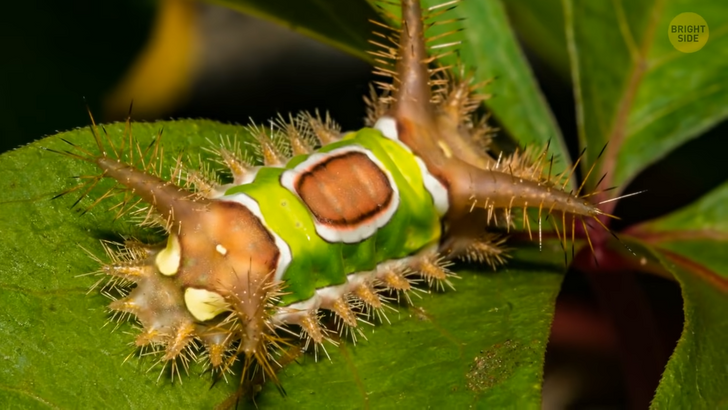
Well-well, we have a titan beetle next! Meet the largest beetle in the whole world: it can grow as long as your entire palm, complete with fingers. Seeing one in the wild can be a shocking experience, especially if it flies right in your face, but don’t fret: thankfully, this giant is placid and won’t bite if you don’t mean it harm.
Still, if you make it angry, never let its mandibles touch you! The bug will hiss and bite, and one such snap can crack a pencil in half. What’s interesting, an adult titan beetle doesn’t feed at all — it doesn’t need food to survive. As a larva, it gets enough energy to keep it well-nourished even when grown up. I’d love that ability!
An even more menacingly looking bug is a giant weta. Living in New Zealand, these cricket-like creatures look like someone forgot to lock the portal to the inferno: a massive, beefy body with six thorny legs, long alien-looking antennae, and big mandibles that just might cut steel.
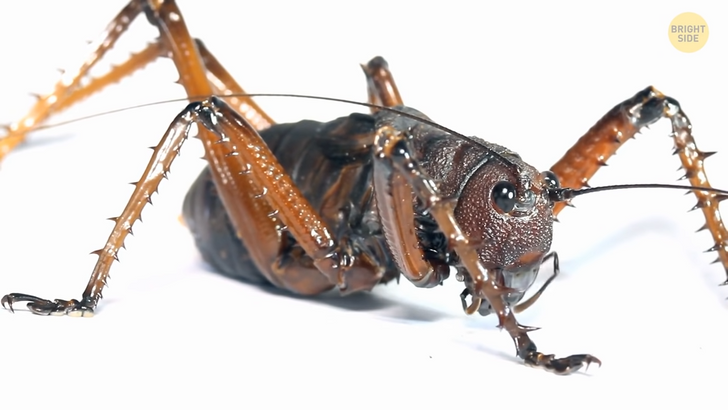
Well, in fact, these giant insects are quite peaceful and won’t bite unless provoked. And even if they do, it’s not as bad as you might think: there are videos with wetas biting hands of people holding them and doing no harm at all. So don’t let it scare you, even though such an insect might weigh more than a full-fledged sparrow!
Atlas moths look like they have three heads, two of which are serpent’s. These pretty nocturnal fliers have strange shapes on the tips of their wings that look like snake heads — this seems to be their mode of defense from predators. And that’s also why they’re sometimes called cobra moths.
In Southeast Asia and India, where they normally dwell, atlas moths are often found on butterfly farms, producing silk. And that’s some sight! The wingspan of one such moth can reach 10 inches — that’s larger than your hand!
Peacock spiders are perhaps the cutest arachnids in the world — second maybe only to their jumping cousins. They’re so tiny you probably wouldn’t even notice one scrambling through your kitchen. But if you get a chance to take a closer look, do it!
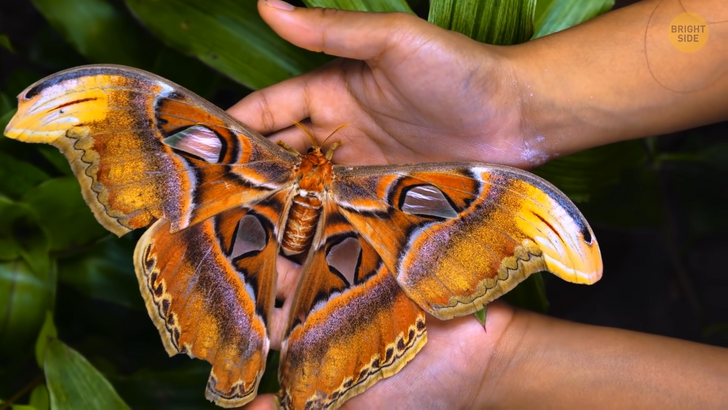
Peacock spiders are beautiful: they have large beady eyes, a shiny blue and red coat, and cute fuzz on their body and legs. And their mating dance is something else entirely! Too bad they only live in Australia.
Another moth on the list: the hummingbird moth! Remember the atlas one, how huge it was? Well, this one’s as big as a hummingbird and holds much more resemblance to its namesake than that! The speed at which it flutters its wings, the long tongue to drink flower nectar, and even the sound it makes when flying — all of it makes you wonder if it’s really a moth, after all. Of course, the fuzzy critter is absolutely safe, and you should consider yourself lucky if you ever see one.
Long-horned orb weaver spider is one of the most unusual arachnids in the world. It’s just your regular spider in all respects but for some reason, it boasts two long curved horns on its back. The back itself is bright orange to ward off predators — red means danger. But scientists are still unsure why this spider needs those prongs — so there’s a web of mystery for you.
The soft rustling of leaves underneath, a pile of them slightly moving, and a big, mighty horn shows up. It’s a Hercules beetle — one of the largest beetles on the planet. Almost half of its size comes from that horn on its head: thanks to this wonderful appendage, you know exactly it’s a male. Females don’t have it at all.
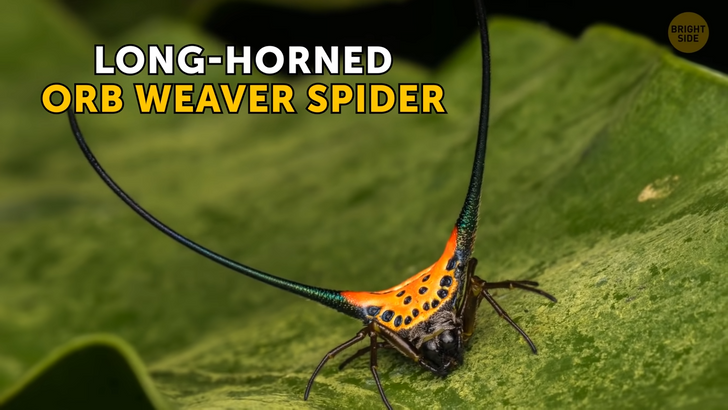
Yet the name comes not only from the horn but from the amazing ability of this giant to haul extremely heavy loads. Its strength is second only to dung beetles: a Hercules can carry as much as 850 times its own weight!
If you ever see a bug with five heads wearing a pointy cap, know you’re not on another planet: it’s a Brazilian treehopper. Straight from a sci-fi movie and onto your screens here, this insect is a real mystery. It’s small and secretive, and much is still unknown about it. No one knows why exactly the treehoppers have these fuzzy balls on their heads, but they’ve only got one head after all, that much is certain.
Going for a swim in a freshwater pond somewhere in the African tropics, watch your toes: you can get a giant water bug hunting them. It’s a predatory bug and the largest of its kind. With those huge pincers, no wonder it’s commonly known as an alligator flea and a toe-biter!
The bite of this water-dwelling monster is really quite powerful. It grabs its prey with the front legs and then slowly munches on it. And when I say it’s a predator, I mean it: giant water bugs’ favorite food is fish and amphibians.
Despite their name, scorpion flies aren’t related to scorpions. They get this moniker thanks to their tails, which look a lot like the notorious arachnids’. Seeing a flying scorpion is a daunting sight at best, but fear not: these critters are small and gentle, and they can’t even bite you. Only the males have such a tail and they use it to attract females. Hey...
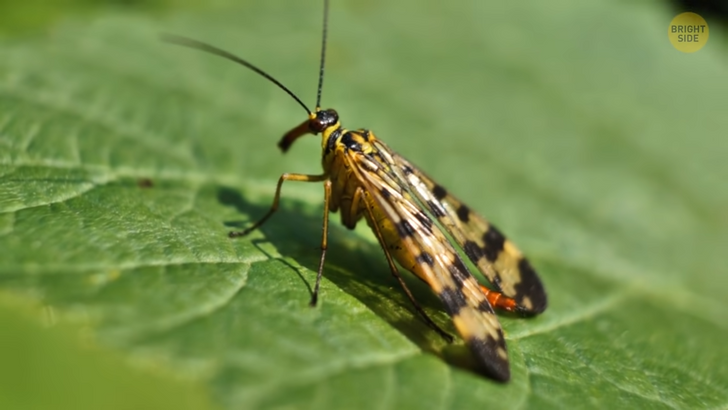
What do you imagine when you hear the words “walking stick”? Certainly not a bug, but that’s exactly what it is. Look at this twig and try to guess: is there something alive on it or not? Yes and no. This twig is not a twig at all — it IS a walking stick.
These insects have developed a fascinating camouflage: they’re long and unassuming, able to stay still for hours on end, which makes them look like dry twigs. But as soon as you touch one, it scrambles away on its gangling legs.
Thanks to their appearance, predatory birds often miss walking sticks in the dense foliage. And their Australian kin give off a pleasant scent, something like peanut butter. Yum!











